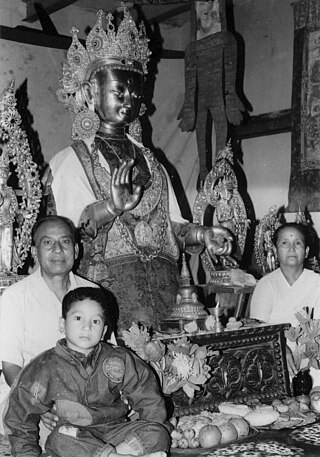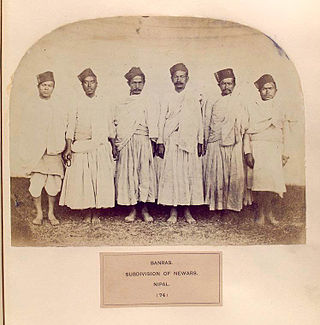Baba and similar words may refer to:

Newar, or Nepami, are the historical inhabitants of the Kathmandu Valley and its surrounding areas in Nepal and the creators of its historic heritage and civilisation. Newars form a linguistic and cultural community of primarily Indo-Aryan and Tibeto-Burman ethnicities following Hinduism and Buddhism with Nepal Bhasa as their common language. Newars have developed a division of labour and a sophisticated urban civilisation not seen elsewhere in the Himalayan foothills. Newars have continued their age-old traditions and practices and pride themselves as the true custodians of the religion, culture and civilisation of Nepal. Newars are known for their contributions to culture, art and literature, trade, agriculture and cuisine. Today, they consistently rank as the most economically and socially advanced community in Nepal, according to the annual Human Development Index published by UNDP. Newars are ranked the 8th largest ethnic group in Nepal according to the 2021 Nepal census numbering 1,341,363 people constituting 4.6% of the total population.
Bhatia is a group of people and a caste found in Punjab, Sindh and Gujarat. Traditionally, they have been a trading and merchant community. The Bhatias primarily live in Northwestern India and Pakistan. The Bhatias, Lohanas and Khatris were similar communities and were known to intermarry. The Bhatias recruit Saraswat Brahmins as priests.
Parekh (Indian) is a surname similar to Parikh. It is an Indian surname mainly used in the Hindu and Jains in the states of Gujarat and Rajasthan. It is Baniya caste. It means assayer in Gujarati, from the Sanskrit word pariksaka or 'examiner.' Also, Oswals and Porwal Banias have clans called Parekh.

Tulādhar is a Nepali/Nepalese caste from the Newar community of the Kathmandu Valley in Nepal. The name Tuladhar is derived from the Sanskrit words "tula" and "dhar" (possessor), thus meaning scale-bearer or in general, merchant. Tuladhars belong to the Uray group which includes Kansakar, Tamrakar, Sthapit, Bania, Sindurakar, Selalik and other castes. They follow Newar Buddhism and speak Nepal Bhasa as a mother tongue.
Bania is a mercantile caste mainly from the Indian states of Gujarat and Rajasthan, with strong diasporic communities in Uttar Pradesh, Madhya Pradesh, West Bengal, Maharashtra and other northern states. Traditionally, the main occupations of the community are merchants, bankers, money-lenders, and owners of commercial enterprises.
The surname Patni "पाटनी" holds historical and cultural significance in the state of Rajasthan, Uttarakhand, Himachal Pradesh, Uttar Pradesh & Gujarat in India. It is associated with various castes like Rajputs, Brahmins, Banias and Jats and has an interesting origin.

Newari Banias are a Bania caste from the Newar community of the Kathmandu Valley in Nepal. The name Bania is derived from the Sanskrit word vanijya (merchant); by preference, Bania (caste).

Kansakār or Kasāh (कसाः) is a Nepalese caste group belonging to the Newar community of the Kathmandu Valley in Nepal. In Sanskrit, Kansakar means bronze worker, and their traditional occupation has been metal working and trading. Today, they are merchants, industrialists and professionals.

Urāy is a Newar Buddhist merchant caste of Kathmandu in Nepal. They are a prominent community in the business and cultural life of Kathmandu. Urays have played key roles in the development of trade, industry, art, architecture, literature and Buddhism in Nepal and the Himalayan region.

Sthāpit is a Nepalese caste from the Newa people of the Kathmandu Valley in Nepal. Sthapits are part of the Uray group which includes Tuladhar, Kansakar, Tamrakar, Bania, Sindurakar, Selalik Kasthakar and other castes. Their religion is Newar Buddhism and their mother tongue is Nepal Bhasa.

Samyak is an almsgiving Buddhist festival celebrated in the Kathmandu Valley in Nepal. During the ceremony which is held on a large open ground, hundreds of Dīpankara Buddha images are assembled, and gifts of different types of food are made to the Buddha images and the Buddhist community.
Baniyas is a port city in Syria.
The Brittial Bania/Bania is an ethnic community in Assam, India. The group traces its roots to a merchant community who reached Assam (Kamarupa) in ancient times. Some historians claim that after the Austric group migrated to ancient Assam, the next group of people who arrived was the Dravidian group, who are represented by the Bania and Kaibbartas today. Unlike the mainland Baniya community, this community of Assam is recognized as a Scheduled Caste by the government of India.
Baniya or Bania is a surname of people belonging to the Hindu Chhetri of Nepal. The alternate spelling of Bania is used by Chhetris and in India. Notable people with these surnames include:
This page is based on this
Wikipedia article Text is available under the
CC BY-SA 4.0 license; additional terms may apply.
Images, videos and audio are available under their respective licenses.






